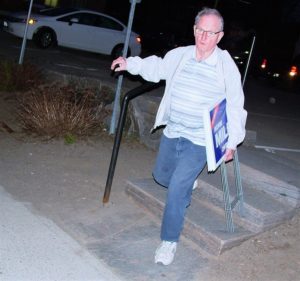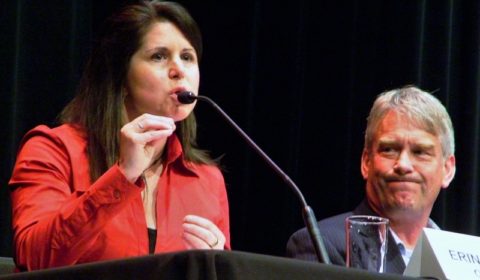Hospitals, Northlander top testy debate
Mark Clairmont | MuskokaTODAY.com
HUNTSVILLE — NHL playoff viewers are raving about the Las Vegas Golden Knights’ organist, whose musical interlude during the Canadian anthem in Game 3 allowed Winnipeg Jets fans to shout the lyrics “… TRUE NORTH STRONG AND FREE ….”
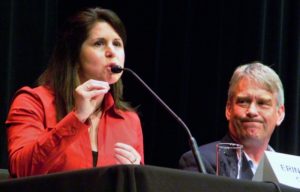
Watch for it tonight.
But last night here at the Algonquin Theatre, the true Northern Ontario was strong, if not totally free.
Provincial candidates at a local debate all took turns championing the North with their calls for more equitable hospital funding and the return of the Northlander train.
The genesis of that began with the first question off the floor from Susan Lovell, who wanted to know what the local member can do keep health and education funding from going to larger centres at the expense of the North.
MPP Norm Miller agreed, calling it “Toronto-centric decision-making.”
He claimed that for the past four years the Liberals have under-funded hospitals and health care.
He cited the most recent round of hospital funding, which saw small- and medium-sized hospitals getting less funding — 1.4 per cent for Muskoka and 1 per cent for Parry Sound, than larger centres that averaged about a 4.6 per cent increase.
Liberal Brenda Rhodes accused Miller of “not doing enough” for his riding.
Miller rebutted: “I’ve been pretty successful,” saying more than once he has had to intervene with a health minister to get them to address “dire” needs to balance Muskoka Algonquin Healthcare annual budgets.
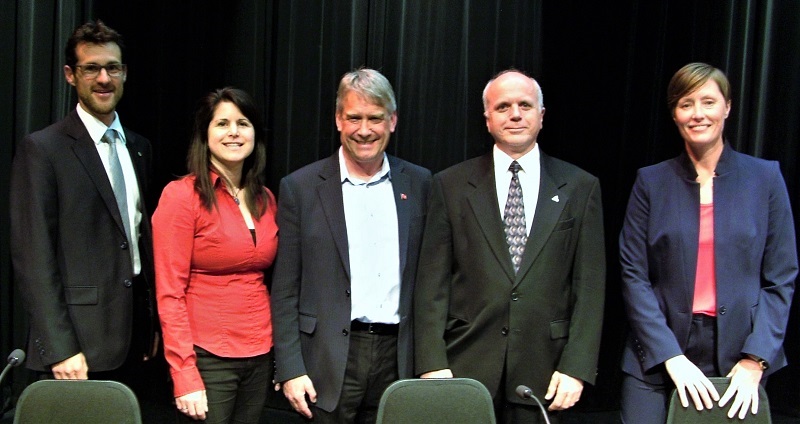
Rhodes added that the NDP’s platform is based on flawed accounting that didn’t take into the full scope of Liberal budgeting.
“Oh, yeah, I want to respond to that,” said the NDP’s Erin Horvath, who added former respected federal auditor Kevin Page verified their figures.
The exchanges were an opening for Matt Richter to chime in: “This is the kind of bickering that doesn’t allow things to get done.”
He wants the Greens to be an intermediary, a bridge-building arbiter that can “bring the parties together.”
Richter said the funding models should be dedicated, “based on local needs.”
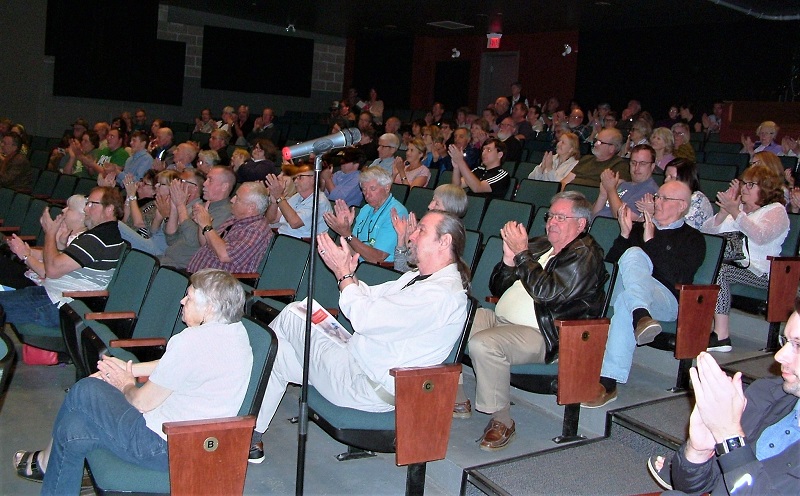
The first two questions on the night — presented by the Huntsville and Lake Bays Chamber of Commerce and the Lakelands Realtors and their media partners — were on long-term care and housing affordability.
Independent candidate Jeff Mole said he could “save hundreds of billions of dollars” of government spending to devote to more beds.
Miller, Rhodes and Horvath promised anywhere from 15,000 to 40,000 beds over the short and long-term.
They are all also committed to extra personal support worker (PSW) care (four hours) at home or in a care facility.
Richter and Miller said more “respect” for PSWs.
Horvath offered a plan to defer taxes till after death to help pay home care costs. And the NDP favour a seniors’ bill of rights.
Rhodes spoke about Liberal funding for home improvements and things like snow-shovelling.
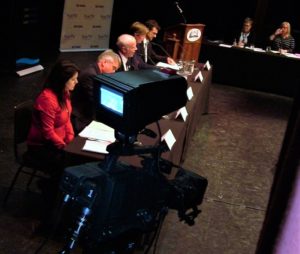
Richter’s response was he’d heard this all before.
“In my 11 years (since he first ran in 2007) nothing has changed.”
On housing, Miller said on his way in he signed the Lakelands Realtors’ petition calling for more affordable housing.
He said government needs to streamline regulations.
Rhodes wants more funding to help renters achieve the dream of home ownership.
Horvath said the NDP promise 65,000 new homes, 20,000 paid through a national housing strategy and 45,000 through provincial initiatives.
She pledged $3 million for co-op housing and a special tax to curb rising costs.
Richter said this was the No. 1 issue in 2007.
He said “we need to offer a solution … it’s there but the government has not acted on it.”
Mole likes the idea of co-op housing.
Rhodes said she agrees, because that’s all the Liberals are doing.
“Inclusionary zoning” is Horvath’s solution, which would mean a certain percentage low-income housing is included when housing subdivisions or apartment/condos are constructed.
“Appropriate — not just affordable,” added Richter.
The answer, said Mole is to narrow the “income gap.”
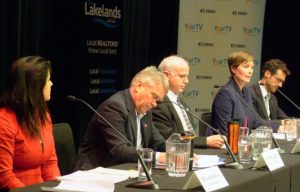
When the question of the environment came up regarding wind farms specifically, Miller said he wasn’t opposed as long as it didn’t impact jobs or taxes.
But he called the Liberals’ Green Act “a disaster” for big business, and for seniors and the poor when higher hydro costs force them to choose between “eating and heating.”
Horvath’s NDP would buy back controlling interest in Hydro One, which Rhodes wrongly though the government already had.
Hydro One if 53 per cent privately held; Ontario owns 47 per cent.
“Ontario is at a cross-roads” in terms of power generation and sales, said Richter, who wants more focus on electricity storage as well as clean energy creation.
A question by Rod McPhee was on government accountability.
Richter suggested road tolls and a highway congestion tax.
Mole said a $130 billion infrastructure deficit is crippling the province’s economic growth.
He said in his opening remarks that privatizing buses took away money that could be spent on education.
Miller said the provincial auditor found $1 billion in savings the government missed out on.
That’s about the cost of the gas plants fiasco under former premier Dalton McGuinty, Miller said.
Rhodes said she has heard this at the doors she’s been knocking on.
“We need to change the way we do politics.”
“Government needs to give its head a shake,” said Mole.
Miller said “you can ask my caucus colleagues, I’m probably the least partisan person in the party.”
He said he can easily work across party lines.
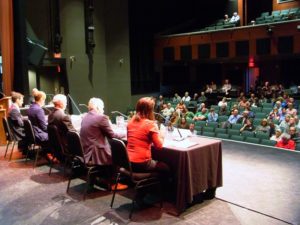
In terms of a question on transportation, Mole urged more use of Uber-like initiatives, as they’ve done in Innisfil rather than municipal bus service.
Miller said PC Leader Doug Ford is committed to bringing back the Northlander train, which the Liberals cancelled in 2012, linking Cochrane to Toronto.
Rhodes says the Liberals are open to a business case that works.
Horvath called the Northlander “a game-changer” that connects the North with the South.
Richter said he spoke to students in Sundridge, the riding’s furthest north community, and they said the train could bring them home; and he said it would allow seniors to travel more easily to Toronto for health appointments.
Richter said it is no coincidence that after the train was cancelled, government travel grants — the extra costs to fly or send patients by other means — “soared.”
Miller noted the NDP didn’t vote against ending the Northlander when they could have and instead propped up the Liberal government and budget.
He also criticized the government’s area-management roads contracts that left Muskoka roads dangerous several winters, after previously being well-managed by the likes of local contractor Fowler Construction
Before, added, Rhodes the Liberals cancelled the contracts, certainly locally.
Rhodes and Horvath think improved bussing will help.
The NDP would pay 50 per cent of local transit systems.
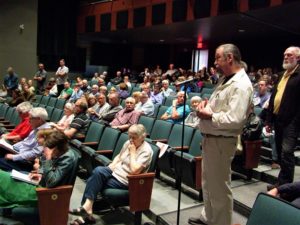
Steve Alcock asked about climate change, which led to several exchanges on cap and trade, pro and con, led by Rhodes in defence of it.
The NDP and Green, too, are for the most part onboard with it.
Miller questioned it, saying half Muskoka vehicle sales are trucks sold to people who live rurally and uses them for work.
He agreed some government initiatives are good, including one that let him convert a truck to propane, saving him the tax.
In closing, the candidates tried to sell themselves as the best choice for voters.
Richter said his two main important assets are his “honesty and integrity.”
He puts people first, because they are the ones with the answers to the problems, not politicians.
He said the Greens are not above taking ideas.
But the former teacher-turned businessperson was confused by Horvath, who he said now speaks against student testing, but was in favour of it a short time ago.
He said he has seen politicians’ promises go south, like a promise to keep the Burk’s Falls hospital open.
“But we keep trying.”
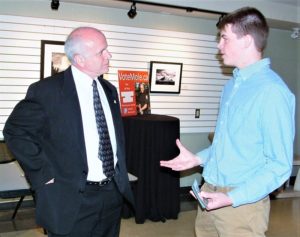
The same on education with the closure of several small schools locally.
“We’re not being honoured here,” he said.
“Imagine what we could do if we had a seat in the legislature.”
Finally, he said: “Vote for Matt Richter. Vote for Parry Sound-Muskoka.”
Horvath summed up, saying she hopes to use her 24 years of activism and community development experience to bridge the “wage discrepancy” she has witnessed in her five years in Muskoka.
She had opened by saying she and her husband, a child psychologist, have opened the HUB in Huntsville as a meeting place for health practitioners and other groups to have a place to meet patients or have meetings.
She said she is not “just an advocate,” but a “change leader,” who has noticed the “out migration” of youth from the riding.
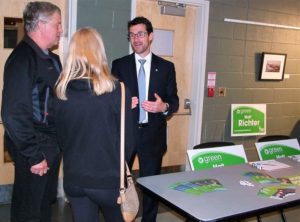
“I’m some who can roll up their sleeves and get involved.”
She’s heard local voters can be traditionalist.
“It’s tradition to vote for them …. I voted for his dad, so I’m going to vote for him”
Her own platform is based on “policy, person and power.”
Horvath wants to see that change.
Remember, she said, “a vote for him (Miller) is a vote for Rob Ford.”
Rhodes reminded the more than 200 on hand that she and the Liberals are about “care over cuts,” a dig at the Tories.
She admits politicians need to change.
“People don’t trust the way we do government.”
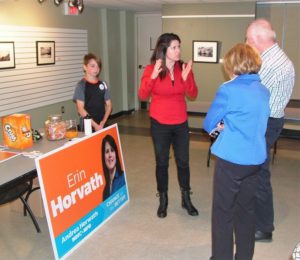
But that is changing with this election and the young, ethnic roster that includes more women candidates.
And it is shedding older politicians, which is “positive change.”
So, “I see potential, I want to see it grow….”
“My wish is that we won’t stand up for more Trump-like politicians.”
Miller wrapped up saying he doesn’t want to see the Liberals and NDP continue with their spending and borrowing was that “leave debt to their kids.”
He said the day care plans by both parties don’t work that well for people in this riding, many moms and dads whose jobs, if they have them, are shift work, contract or seasonal.
Miller said he is proud of his record that included his work to change the Accommodation Review Process that studies small school closures. He said the school boards must now look at the social and economic impact they would have.
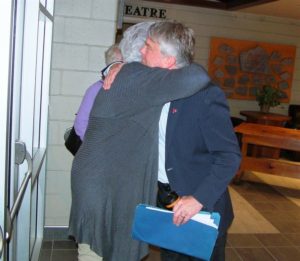
He also noted his efforts to divert coffee filters from landfills and his efforts for safe cycling on roads and highways with dedicated shared lanes.
And his efforts to keep Muskoka with two full-service hospitals, which he said Ford is also committed to doing.
That would also include adequate small hospital funding would be restored under the funding formula.
“We can do better than the last 15 years.”
Mole, who said Miller “has done a pretty good job,” finished the debate by urging electors to “vote strategically.”
“Hopefully there is a minority government — or a majority.”
“It’s time for Parry Sound-Muskoka to do better.”
NOTES: Rhodes and Horvath both acknowledged the night’s meeting was being held on traditional native lands … The next debate is Wednesday, May 24 at the Stockey Centre in Parry Sound.
